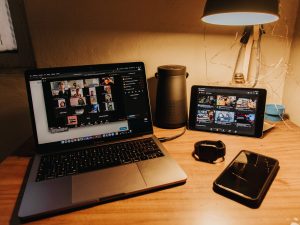In today’s technological world, it has become easier than ever to stay in touch. This has countless benefits but brings with it a number of negative consequences. Primarily, the lines between work time and personal time have blurred, but likely not in a way that is benefiting you. While it is still expected that you do not bring your personal life into work, employers are increasingly comfortable pushing work into your personal life. In many cases employers may not even realize the presumption of this-it’s just a quick email or it will just take a second- but it does not make it any less damaging.
THE GUILT FACTOR
Do you feel guilty if you don’t check email while on vacation and/or they feel compelled to make yourself available in the case of an emergency? Worse still, does your employer require that you make yourself available during your personal time? Maybe you think it’s no big deal since you aren’t contacted all that much, but the problem is, even if you are never contacted, you are on guard. You keep your phone close by, and you keep work on your mind. You never get a break and a chance to disconnect and recharge. Whether it’s physically or emotionally, taking work home with you is detrimental to your wellbeing.
In the nonprofit world especially, we feel obligated to our clients. We entered this sector to help others and often sacrifice our own needs for the benefit of our clients. In an attempt to go above and beyond serving those we have dedicated our careers to serving, we paradoxically serve them less than we are capable of. Reason being, when we are exhausted, frustrated and burnt out, we are not bringing our best selves to our work.
REWARDING QUANTITY AND NOT QUALITY
Many employers cling to the idea that more is more. They reward- blatantly or subtly- the first in, last out employee. Regardless of efficiency, they think that working long equates to working well. The 2017 version of first in last out, is the employee who, through technology, is accessible at all times. Look how dedicated she is they may think as you answer emails at 11:30 on a Tuesday night. Look how much she cares about the company, they may decide as you get on a conference call from the business center of your beachside hotel. What they fail to understand, however, is that by preventing yourself from fully disconnecting from work, you are turning yourself into a less productive worker. But the truth is, bosses often only see the quantity and not the quality. In fact, in one study, bosses couldn’t tell the difference between staff who actually worked 80 hours a week and those who simply put in extra time without any work.
WHY MORE IS LESS
Having work on your mind at all times makes you a less productive employee. The research is crystal clear. Despite what too many managers continue to think, working longer hours does not help you get more done. In fact, each hour you work over a standard 8-hourday has a decreasing rate of productivity. This happens for a number of reasons, a major one being that fatigue sets in. Thinking becomes less clear and more mistakes are made. Further, if you are working extra hours just to show your boss you are working extra hours, chances are, you are stretching out how long it takes you to do your work rather than doing additional work, a phenomenon known as Parkinson’s Law. Secondly, the mind and body can only work productively for so long without taking a break. For maximum productivity, you should take a break from your work every 50-90 minutes. Instead of encouraging this break time, most of us receive the message that we should plow through the day, eat lunch at our desks and work as much as we possibly can. The problem with this thinking- not taking breaks decreases our productivity while increasing our mistakes and as a result, wastes more time than the breaks we should be taking. Why do we continue to operate this way?
NEGLECTING OUR PERSONAL NEEDS
Having a healthy social life outside of our work is essential to our wellbeing. Relationships with friends and family, hobbies, exercise and spiritual practices all contribute to our happiness and general life satisfaction. When our work begins to infringe upon these parts of our lives, our relationships and our general wellbeing suffer. Neglecting these areas causes discord in our lives which, inevitably, bleeds into our work life, whether our employers want it to or not. Regardless of how hard we try to emotionally compartmentalize, we simply aren’t built that way. Dissatisfaction at home shows up at work and vice versa.
Further, for those of us who sit at a desk behind a computer all day, there are serious health risks associated with working long periods of time. Physically and mentally, we need to disconnect, move our bodies and rest our minds.
COMMITTING TO YOUR TIME OFF
Making a commitment to yourself to stop work from infiltrating your personal life is a life-changing decision. Not only will your personal life be more fulfilling and satisfying, you will feel revitalized and refreshed when you return to work. Whether it is your lunch break, the weekend or your vacation, it is up to you to claim your time and commit to it. You may have a boss who encourages this and respects it. Or you may have a boss who pushes back against it. It is up to you to draw and maintain your boundaries. Explain and show your boss that more is less and that you can do your job effectively and efficiently during scheduled working hours. If she refuses to hear you and respect your boundaries, perhaps it is time to find someone who does.
CREATING THE LIFE YOU WANT
In the working world, much of what we do is a result of what we have always done. We don’t always take the necessary time and thought to question if what we are doing is the best way. This holds true for time and productivity. Despite overwhelming research that working more is harming us, we continue the rhetoric that pushing through is the best way. It is time we honor the research and honor ourselves by taking the necessary time off that we need to be our best selves.
If taking this plunge feels like too much all at once, are you ready to commit to taking the first step? How about committing to taking a lunch every day? Or a 15-minute walk? Or from putting the laptop away in the evenings? I know it can be scary, and I can’t promise there won’t be ramifications, but if you are like most others, once you are able to reclaim your time and keep work out of your personal life, you will not only become a more productive worker but a more fulfilled human being. Can you commit to yourself today?






3 Responses